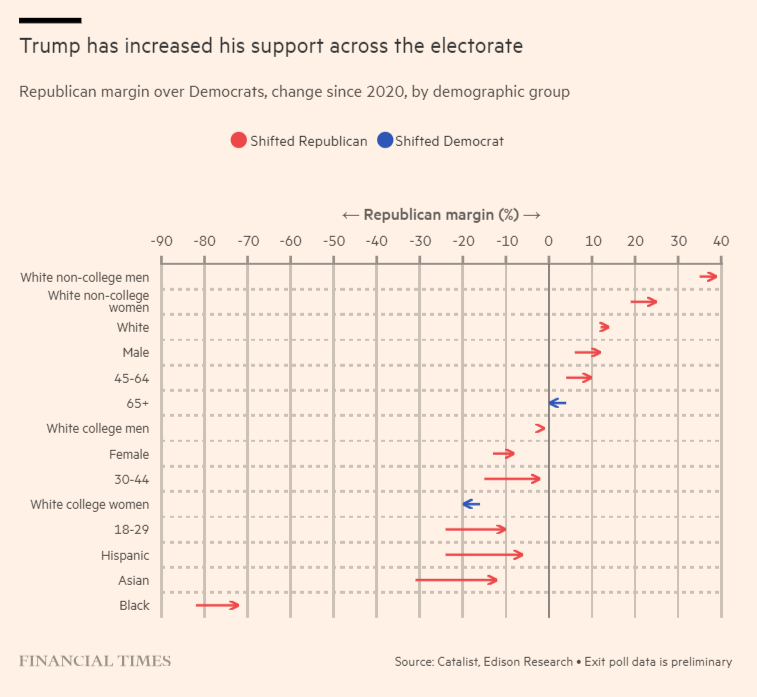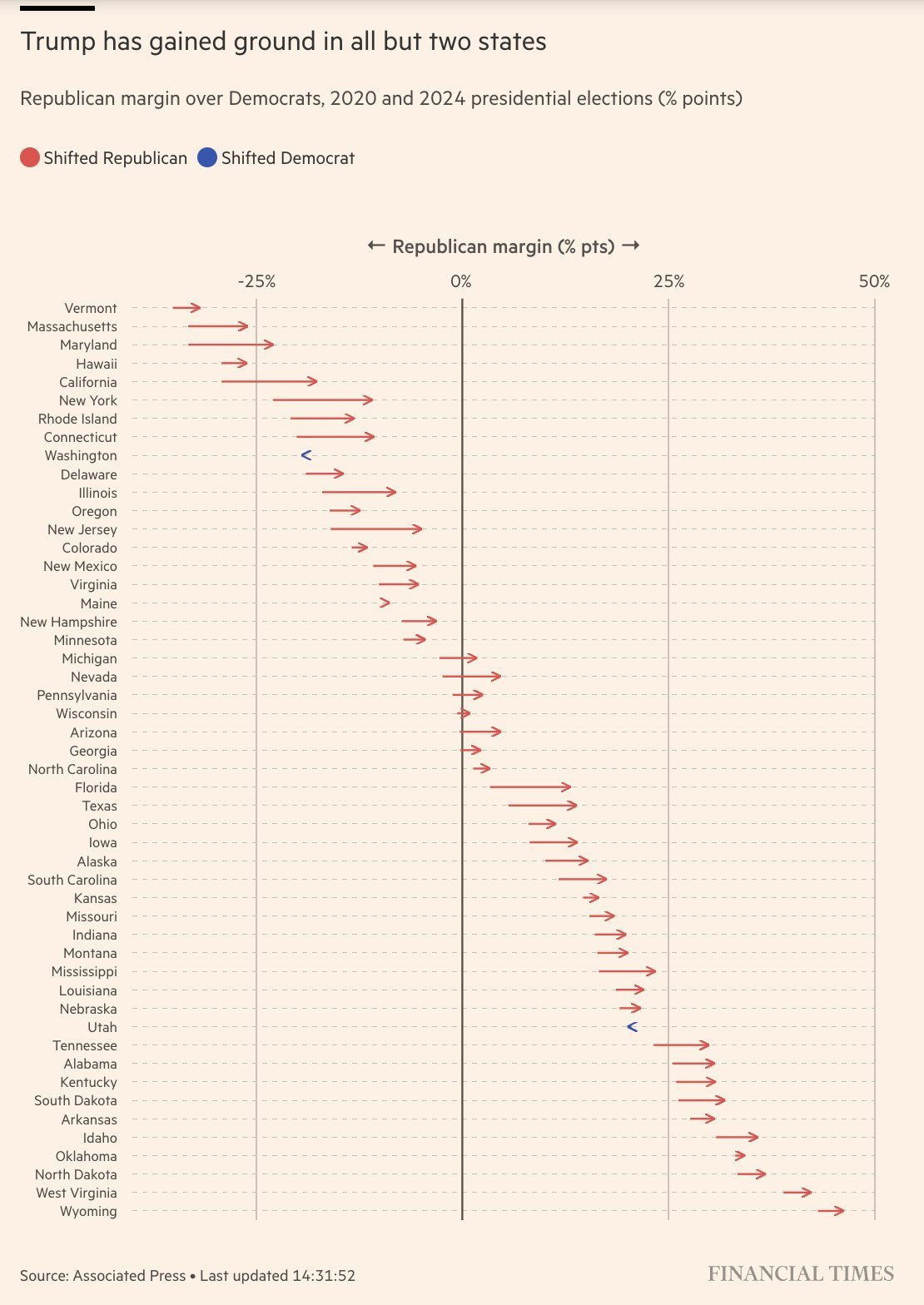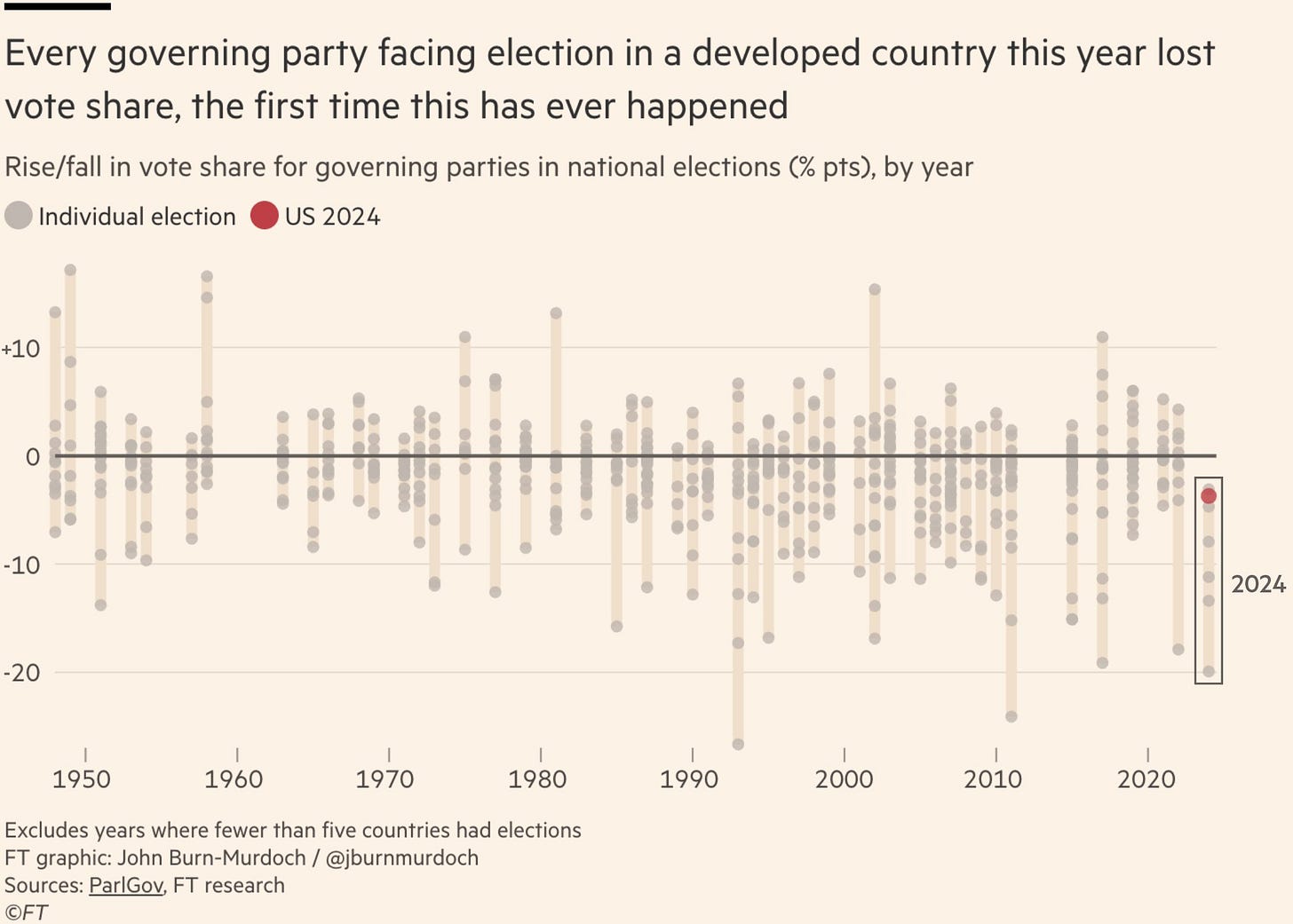The Real Reason Trump Beat Harris
There were larger forces at play.
Everyone has an opinion about why the 2024 presidential election played out the way that it did.
Some people are saying that Kamala Harris was too liberal. Others are saying that she wasn’t liberal enough.
And some even claim that she blew it by not going on the Joe Rogan podcast.
What if I told you that none of those things really mattered? Let me explain.
I’m sure that by now many of you have seen charts like these, which show a sharp rightward political shift across the country in almost every demographic and every state.
Even liberal bastions like New York City swung hard to the right, as this chart from Nate Silver shows.
So if you look at these charts, you might think: voters just didn’t like the liberal policies that Harris represented, and they vigorously rejected them at the ballot box.
But is that really the case?
Exit poll after exit poll showed that the economy was the top issue for voters. They also showed that President Biden’s approval rating was really low.
That makes you think that maybe this had nothing to do with Harris at all. Voters didn’t like the state of the economy and they blamed Biden for that.
Earlier this year, John Sides, a professor of political science at Vanderbilt University, created this chart plotting the president’s approval rating against the incumbent party’s share of the popular vote.
Based on Biden’s low approval rating of less than 40%, he or any other Democrat was projected to get 48% of the vote.
As I’m writing this, the votes are still being counted, but that’s almost exactly where it looks like Harris will end up— with 48% of the vote.
Now, some of you might look at that and think: “Sure, people didn’t like the economy— but that’s a reflection of the bad economic policies of the Biden administration, and Harris was a part of that administration. That’s why she lost.”
But that might not be the real explanation.
Here's a piece of evidence that suggests that larger forces were at play in the 2024 election: it’s the fact that incumbent parties across the world have been losing elections this year.
John Burn-Murdoch of the Financial Times points out that incumbent parties in the U.S., the U.K., France, Japan, and even India have lost votes in this year’s elections.
In fact, he says that every incumbent party in developed countries has lost votes this year, the first time this has happened in the 120 years that this data has been tracked.
That’s a pretty remarkable statistic and it seems to indicate that a bigger force was responsible for the U.S. election results.
So, what could that force be?
Well, it’s probably inflation. We all know it: prices for everything— from groceries to automobiles to houses— rose dramatically between 2021 and 2023, and people were, and still are, really upset about it.
The cost of living was the primary reason the U.K.’s conservative party lost power after 14 years earlier in 2024. And it’s partly the reason why Japan’s Liberal Democratic party lost its parliamentary majority for the first time in 15 years.
Inflation was, of course, a global phenomenon caused by pandemic-related supply chain issues, not the result of actions taken by any particular government.
But people want someone to blame, hence, the backlash against incumbent parties all around the world.
Here’s some more evidence that inflation might have been a big factor in this year’s election results.
Back in 2020, voters who made less than $100,000 backed Biden over Trump, while those who made more than $100,000 favored Trump over Biden.
This time around, it was reversed, with Harris getting more votes from those who made over $100,000 than Trump did, while doing worse than him when it comes to voters making less than $100,000.
People with lower incomes tend to feel the effects of inflation more than those with higher incomes, so that might be the reason for the switch— and the reason voters overall rejected Harris (the median income for workers in the U.S. is around $60,000).
The Incumbency Advantage
All of this also ties into another theory I've been hearing: that the president's incumbency advantage is gone.
It used to be the case that if you were a president running for reelection, you had a leg up because you could dominate the news coverage; you could use your presidential powers to implement popular policies; and you could campaign more effectively than your opponent.
Before Trump’s first term, there were three straight presidents who won reelection over a 24-year period: Clinton, Bush and Obama.
And going back further before Trump, in the 11 presidential elections with incumbent candidates, eight were won by the incumbent.
That’s the incumbency advantage.
But something might be changing; we saw Trump lose his first reelection bid, and now Biden’s Vice President, Harris, lost against Trump.
As this tweet from Joey Politano points out, social media “makes it easier than ever for voters to concentrate disaffection on whoever’s in power.”
In other words, rather than there being an incumbency advantage, there may actually be an incumbency disadvantage now.
And if that’s the case, then we might see more elections like the one we just had, where the incumbent party loses.
I’m not saying that will definitely be the case— it’s just a theory based on a small sample size. But it’s something to think about.
Anyway, I know some of you are going to agree with what I’ve said and some of you are going to disagree with it. Everyone is going to have their own favorite theory for why Trump beat Harris.
Personally, I like this theory about how there’s a bigger force in play because I think it matches up with what we’ve seen historically.
We all know that in the U.S., one party never stays in power forever. We have a constant swing back and forth from Democrats to Republicans.
That’s an inevitability. And even though that’s the case, every time it happens, there’s a lot of chest-thumping and gloating on the winning side, and a lot of finger-pointing and soul searching on the other.
It might not be satisfying to hear, but sometimes the results have nothing to do with the candidates.
But who knows? Maybe there are factors bigger than inflation and anti-incumbency sentiment that played a role in the election outcome this year.
Maybe Trump’s messaging around issues like immigration and crime really resonated with voters.
Or maybe if Biden stepped aside sooner and allowed an open nomination process, the outcome might have been different.
I don’t know; there are a million different things that happened and that could have happened.
I just think that people really hated the high inflation of 2021 through 2023, and they really wanted to blame someone for it.
They finally got their chance in this election.










My reason: Introducing The Paycheck to Paycheck Voter https://shorturl.at/6AIkb
Remember Remember the 5th of November https://shorturl.at/PFtAJ